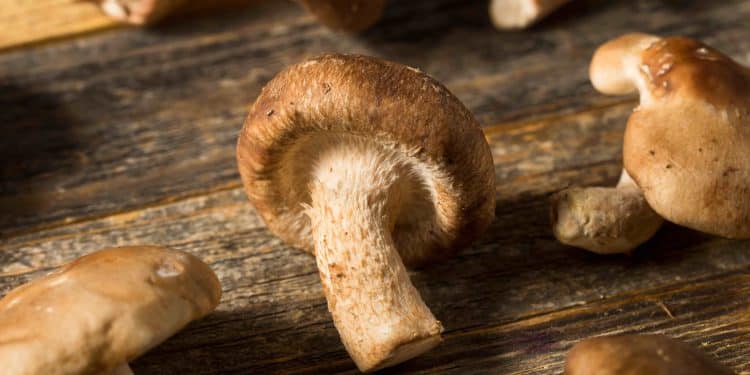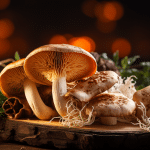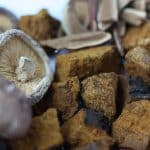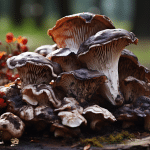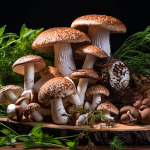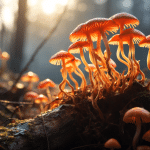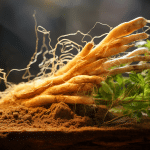Shiitake mushrooms are one of the most popular types of mushrooms for eating, packed with nutrients and providing many health benefits. But, there is the potential to have a negative reaction and suffer side effects to this mushroom, and knowing how to spot the side effects of shiitake mushrooms may help you to know whether this is not a food for you. So, what are the side effects of shiitake mushrooms, and how can you identify them?
Well, according to Colorado State University, this species of fungus has a wide, brown cap and thin, bent stem. These mushrooms are rich in useful carbohydrates, vitamins, and fiber, which can all help to prevent high blood pressure, heart problems, and decreased immune function, according to February 2016 studies in Saudi Journal of Biological Sciences. Shiitake mushrooms are edible mushrooms that are usually safe to eat (unless you have a known allergy – more on this below) if you purchase them at the grocery store and avoid the wild varieties.
You can also purchase shiitake extract and Japanese mushroom supplements, although you will want to consult your physician before trying either of these products. That is because the FDA does not require supplements to prove they are safe or effective before selling them, so there is no guarantee what you are taking is safe, contains the ingredients that claim it does, or produces the effects it claims.
But there are occasionally side effects from Shiitake mushrooms. Here are a few of the potential pitfalls to eating these mushrooms.
Allergic Reactions and Side Effects of Shiitake Mushrooms
Although not one of the most common food allergens, it is possible to be allergic to Shiitake mushrooms, or allergic to other wild mushrooms.
An allergic reaction occurs when your immune system overreacts to food.
How to treat: If you know that you have a fungus allergy, avoid eating Shiitake mushrooms and any products that are made from them.
You May Experience Digestive Issues
The Shiitake mushrooms that you buy at the grocery store are generally safe for consumption. But mushrooms picked at the wild can sometimes contain toxins that can trigger vomiting and diarrhea.
Shiitake mushrooms are also difficult to digest for those who have an intolerance, which can happen when your body has trouble processing a specific food, according to the American Academy of Allergy, Asthma, & Immunology (AAAAI). To remedy this issue if you have an intolerance to Shiitake mushrooms, you are better off choosing to substitute your meals with other mushrooms (or something such as vegetables) instead.
Skin Rash as a Side Effect
When it comes to the effects of Shiitake mushrooms, the mushroom allergies rash is not the only skin response that you might have. In fact, eating the fungus raw or undercooked may also cause a shiitake rash called Shiitake Dermatitis. A shiitake rash usually develops one or two days after eating the mushrooms, and photos of shiitake dermatitis suggest that the rash looks similar to squiggly marks. It is caused by toxic reactions to lentinan, the substance in mushrooms, according to the pharmacognosy review study. An older study from 1993 in the Journal Dermatology suggested this rash might be sun-sensitive, although more studies are needed to better understand whether that is true.
Treatment: According to the pharmacognosy review research, Shiitake dermatitis is treated with anti-histamine drugs or corticosteroids, usually getting better in about two weeks.
Potential for Food Poisoning
According to the Colorado State University, documented cases of food poisoning in the United States are few and far between. Still, you can get food-borne illnesses from a nasty Shiitake mushroom.
According to the Colorado State University, if you consume mushrooms contaminated by bacteria in their growing or processing stage, this could be the case. In the past, even moldy mushrooms, which are then canned, distributed, and consumed, have caused food poisoning. Pathogens from raw meat, poultry, seafood, or eggs also transfer onto mushrooms (or any food, for that matter) when handled in close proximity, according to the Centers for Disease Control and Prevention (CDC).
Mushrooms are also perishable, according to FDA. In other words, if not stored correctly, older mushrooms will get you sick. So, what happens if you eat bad mushrooms? You could experience nausea, diarrhea and vomiting.
You can find our favorite supplements containing Shiitake Mushrooms on the following page of our website to learn more.
Best Shiitake Mushroom Supplement
